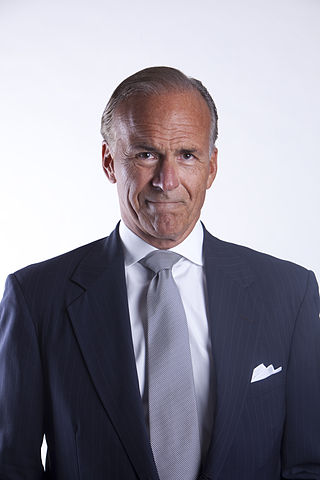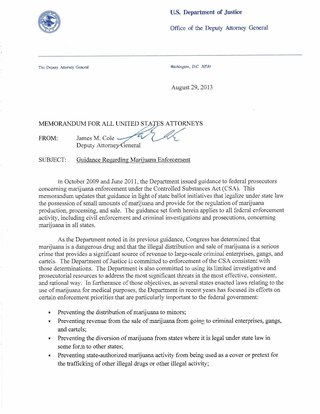Related Research Articles

The United States Department of Justice (DOJ), also known as the Justice Department, is a federal executive department of the United States government tasked with the enforcement of federal law and administration of justice in the United States. It is equivalent to the justice or interior ministries of other countries. The department is headed by the U.S. attorney general, who reports directly to the president of the United States and is a member of the president's Cabinet. The current attorney general is Merrick Garland, who has served since March 2021.

The United States Secret Service is a federal law enforcement agency under the Department of Homeland Security charged with conducting criminal investigations and protecting U.S. political leaders, their families, and visiting heads of state or government. Until 2003, the Secret Service was part of the Department of the Treasury, as the agency was founded in 1865 to combat the then-widespread counterfeiting of U.S. currency. President Abraham Lincoln signed the legislation on April 14, 1865, just a few hours before he was assassinated. In 1901, the Secret Service was also assigned to presidential protection duties.

The Violent Crime Control and Law Enforcement Act of 1994, commonly referred to as the 1994 Crime Bill, or the Clinton Crime Bill, is an Act of Congress dealing with crime and law enforcement; it became law in 1994. It is the largest crime bill in the history of the United States and consisted of 356 pages that provided for 100,000 new police officers, $9.7 billion in funding for prisons which were designed with significant input from experienced police officers. Sponsored by U.S. Representative Jack Brooks of Texas, the bill was passed by Congress and signed into law by President Bill Clinton. Then-Senator Joe Biden of Delaware drafted the Senate version of the legislation in cooperation with the National Association of Police Organizations, also incorporating the Assault Weapons ban and the Violence Against Women Act (VAWA) with Senator Orrin Hatch.

In the United States, a Joint Terrorism Task Forces (JTTF) is a locally-based multi-agency partnership between various federal, state, and local law enforcement agencies tasked with investigating terrorism and terrorism-related crimes, led by the Federal Bureau of Investigation and U.S. Department of Justice. The first JTTFs were established before the September 11 attacks, with their numbers increasing dramatically in the years after.
Campus police or university police in the United States and Canada are sworn police or peace officers employed by a college or university to protect the private or public property of the campus and surrounding areas and the people who live, work, and visit it. In instances where they are not technically police officers, they are often known as campus safety or campus security.

As of 2020, more than 800,000 sworn law enforcement officers have been serving in the United States. About 137,000 of those officers work for federal law enforcement agencies.
Section 287(g) of the U.S. Immigration and Nationality Act authorizes the Department of Homeland Security (DHS) to deputize selected state and local law enforcement officers to enforce federal immigration law. Section 287(g) allows the DHS and law enforcement agencies to make agreements, which require the state and local officers to receive training and work under the supervision of U.S. Immigration and Customs Enforcement. ICE provides the officers with authorization to identify, process, and—when appropriate—detain immigration offenders they encounter during their regular, daily law-enforcement activity.

Thomas Edward Perez is an American politician and attorney currently serving as senior advisor to the president of the United States and director of the White House Office of Intergovernmental Affairs, holding both positions since June 2023. Perez previously served as the United States secretary of labor (2013–2017), the chair of the Democratic National Committee (2017–2021), and United States assistant attorney general for civil rights (2009–2013).

The Arctic policy of the United States is the foreign policy of the United States in regard to the Arctic region. In addition, the United States' domestic policy toward Alaska is part of its Arctic policy.

Community policing or community-oriented policing (COP) is a strategy of policing that focuses on developing relationships with community members. It is a philosophy of full-service policing that is highly personal, where an officer patrols the same area for an extended time and develops a partnership with citizens to collaboratively identify and solve problems.

Charles B. DeWitt, is an American government official who served at the White House Office and the United States Department of Justice. DeWitt served as Director of the National Institute of Justice from 1990 to 1993.

The militarization of police is the use of military equipment and tactics by law enforcement officers. This includes the use of armored personnel carriers (APCs), assault rifles, submachine guns, flashbang grenades, sniper rifles, and SWAT teams. The militarization of law enforcement is also associated with intelligence agency–style information gathering aimed at the public and political activists and with a more aggressive style of law enforcement. Criminal justice professor Peter Kraska has defined militarization of police as "the process whereby civilian police increasingly draw from, and pattern themselves around, the tenets of militarism and the military model".

Police reform in the United States is an ongoing left-wing political movement that seeks to reform systems of law enforcement throughout the United States. Many goals of the police reform movement center on police accountability. Specific goals may include: lowering the criminal intent standard, limiting or abolishing qualified immunity for law enforcement officers, sensitivity training, conflict prevention and mediation training, updating legal frameworks, and granting administrative subpoena power to the U.S. Department of Justice for "pattern or practice" investigations into police misconduct and police brutality.

Jeremy Travis is an American academic administrator who served as the fourth president of John Jay College of Criminal Justice, a senior college of the City University of New York, starting on August 16, 2004. On October 25, 2016, Travis announced that he would step down from his position as president the next year. In August 2017, he joined the Arnold Ventures LLC as Senior Vice President of Criminal Justice.

The 21st Century Cures Act is a United States law enacted by the 114th United States Congress in December 2016 and then signed into law on December 13, 2016. It authorized $6.3 billion in funding, mostly for the National Institutes of Health. The act was supported especially by large pharmaceutical manufacturers and was opposed especially by some consumer organizations.

Tracey L. Meares is an American legal scholar and author. She is the Walton Hale Hamilton Professor of Law at Yale Law School. Previous to joining the Yale Law School faculty, she was Max Pam Professor of Law and Director of the Center for Studies in Criminal Justice at the University of Chicago Law School. At both Chicago and Yale, she was the first African-American woman to be granted tenure.

James Edward Johnson is an American politician, attorney, and community activist, who was formerly an Assistant Secretary of the Treasury and Under Secretary of the Treasury for Enforcement, where he received the Hamilton Award, the Department of Treasury's highest award. He was a Democratic Party candidate in the 2017 New Jersey gubernatorial race.

The Cole Memorandum was a United States Department of Justice memorandum issued August 29, 2013, by United States Deputy Attorney General James M. Cole during the presidency of Barack Obama. The memorandum, sent to all United States Attorneys, governed federal prosecution of offenses related to marijuana. The memo stated that given its limited resources, the Justice Department would not enforce federal marijuana prohibition in states that "legalized marijuana in some form and ... implemented strong and effective regulatory and enforcement systems to control the cultivation, distribution, sale, and possession of marijuana," except where a lack of federal enforcement would undermine federal priorities.
A civilian police oversight agency, also known as citizen review board or civilian review board, is a body of civilians that is tasked with reviewing and improving police conduct.

Ronald L. Davis is an American law enforcement officer. He is Director of the United States Marshals Service.
References
- 1 2 "President's Task Force on 21st Century Policing - Implementation Guide" (PDF). Office of Community Oriented Policing Services . Washington DC: United States Department of Justice. 2015.
- ↑ Kaste, Martin (13 January 2015). "Obama's Policing Task Force Begins With Public Hearing". NPR . Retrieved 24 September 2016.
- ↑ Sneed, Tierney (2 March 2015). "Obama's Policing Task Force Releases Report". U.S. News & World Report . Retrieved 25 September 2016.
- ↑ "President's Task Force on 21st Century Policing" (PDF). Office of Community Oriented Policing Services . Washington DC: United States Department of Justice. May 2015.
- ↑ "President's Task Force on 21st Century Policing Recommendations: From Print to Action". www.justice.gov. 2015-07-28. Retrieved 2020-08-07.
- ↑ Rhodan, Maya (8 July 2016). "Why President Obama's Police Reform Is a Work in Progress". Time . Retrieved 25 September 2016.